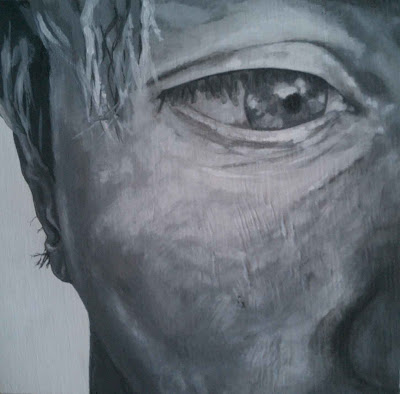'The Lord Answering Job Out of the Whirlwind' (If I have a face transplant, am I still me?)
All we can ever know for certain about death is that a living person grows strangely still. We each have a fantasy about what happens after death and this fantasy determines how we see the purpose of life. If we see death as the end of our identity, the purpose of our life becomes making this life satisfactory.
There is an infinite number of ways in which we might choose to define "satisfactory", but whichever we choose becomes our purpose.
If we see death as the doorway to another life, we have to decide whether this next life will be better than this one. To give us hope, we decide that the next life will be better. This raises the question of justice. Do all people go on to this better life, or are there standards that have to be met?
A sense of justice leads us to choose standards, and in doing so we condemn ourselves to living this life in terms of the next. If you set standards which you can easily reach, you limit the amount of self-inflicted pain you will suffer, but if you acquire, say, a Calvinist conscience you set yourself impossible standards, and berate yourself for your constant failure to live up to them.
For all of us, life is full of uncertainties and difficulties, and it ends in death. Every religion claims to overcome death, to provide certainty, and reward us for being good. So great is our fear of life and death that most of us allow hope to override our intellect.
No religion accepts us as the person we know ourselves to be. Rather, we are told that we are inadequate, unsatisfactory and helpless. We fear that this is so, and to give us hope we construct a fantasy about how we are superior to those who do not share our views.
On these grounds we feel entitled to force our views on non-believers, and, if they resist, to kill them. I think that the man Jesus wouldn't have approved of such views, and this set me on the path of understanding that, although people differ as individuals and in terms of culture, basically all human beings are the same.
We all want to be the person we know ourselves to be, and for others to recognise this and treat us with respect. We want to live without being dominated by fear, to enjoy good relationships, and to have a secure place in our society. No one is better than anyone else by virtue of their beliefs.
When we are able to be the person we know ourselves to be, without vanity or self-pity, we have the wonderful experience of feeling at home with everything that exists. Some people describe this in religious terms, some in terms of nature, but, whatever, I do not feel the need to have a religion tell me what I should believe.
There is an infinite number of ways in which we might choose to define "satisfactory", but whichever we choose becomes our purpose.
If we see death as the doorway to another life, we have to decide whether this next life will be better than this one. To give us hope, we decide that the next life will be better. This raises the question of justice. Do all people go on to this better life, or are there standards that have to be met?
A sense of justice leads us to choose standards, and in doing so we condemn ourselves to living this life in terms of the next. If you set standards which you can easily reach, you limit the amount of self-inflicted pain you will suffer, but if you acquire, say, a Calvinist conscience you set yourself impossible standards, and berate yourself for your constant failure to live up to them.
For all of us, life is full of uncertainties and difficulties, and it ends in death. Every religion claims to overcome death, to provide certainty, and reward us for being good. So great is our fear of life and death that most of us allow hope to override our intellect.
No religion accepts us as the person we know ourselves to be. Rather, we are told that we are inadequate, unsatisfactory and helpless. We fear that this is so, and to give us hope we construct a fantasy about how we are superior to those who do not share our views.
On these grounds we feel entitled to force our views on non-believers, and, if they resist, to kill them. I think that the man Jesus wouldn't have approved of such views, and this set me on the path of understanding that, although people differ as individuals and in terms of culture, basically all human beings are the same.
We all want to be the person we know ourselves to be, and for others to recognise this and treat us with respect. We want to live without being dominated by fear, to enjoy good relationships, and to have a secure place in our society. No one is better than anyone else by virtue of their beliefs.
When we are able to be the person we know ourselves to be, without vanity or self-pity, we have the wonderful experience of feeling at home with everything that exists. Some people describe this in religious terms, some in terms of nature, but, whatever, I do not feel the need to have a religion tell me what I should believe.


Comments